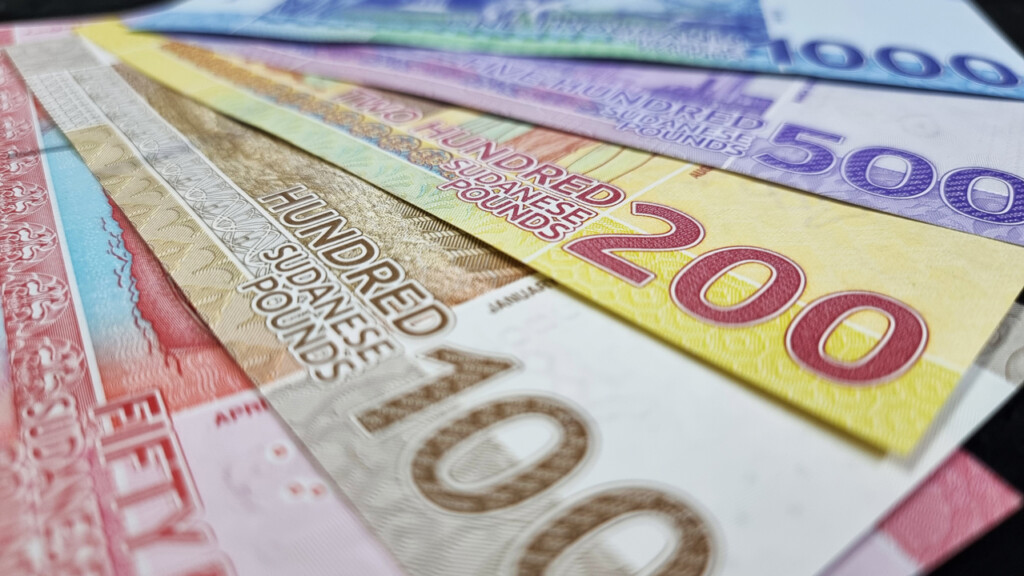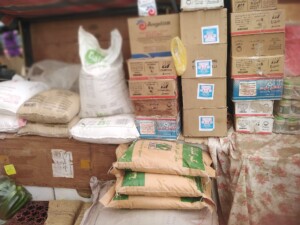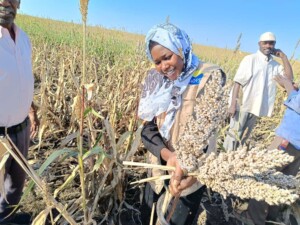Sudanese Pound ‘collapses’ against hard currencies as CBoS limits bank transfers

Sudanese Pounds (File photo: Andrew Bergman / RD)
The Sudanese Pound has recorded an ‘unprecedented collapse’ against foreign currencies in the parallel market, as the US Dollar sold for more than SDG900 yesterday. The Bank of Khartoum was quoting SDG635 for the greenback. Online rates monitor Xe.com quotes SDG600 to the dollar, however that rate has changed little since the outbreak of the current hostilities in April this year. The Central Bank of Sudan (CBoS) has limited transfers from both regular and ‘privileged’ accounts.
Banking expert Mohamed Esmat attributed the sharp decline in the value of the pound to the increasing demand for the dollar in pursuit of imports that require foreign currency.
“It seems that there is a huge mass of local currency, that someone has injected into the market, that is being converted into foreign currencies to meet obligations outside Sudan,” he told Radio Dabanga.
On Tuesday, the Central Bank of Sudan (CBoS) set limits for transferring money via phone applications. The daily maximum for a regular account has been set at SDG6 million, and a ‘privileged’ account at SDG10 million. The monthly limit for a regular account is set at SDG100 million, while a ‘privileged’ account may not exceed SDG200 million a month.
Esmat predicted that the decline of the Sudanese Pound will continue during the coming period, as there are large amounts of local currency in the hands of sellers, and is expected to continue the process of what he called “lawlessness” in the market.
In addition to the traditional reasons for the devaluation of the currency, such as lack of exports, weak production, revenues, and others, people feel the absence of the state and its institutions concerned with preserving the value of the currency, which led them to resort to dollars or foreign currencies as a store of value in the event of obtaining cash, he said.
Other assets of value, such as gold and land, are vulnerable to loss due to insecurity across the country, Esmat said.
General Intelligence Service (GIS) yesterday accused the Rapid Support Forces (RSF) and members of the public of carrying out speculation. The banking expert downplayed the ability of the service to take measures and policies that would rein in the dollar. He ruled out the impact of ordinary speculators on the parallel currency market, but did not rule out the presence of large sums of local currency with the RSF “that wants to convert them into dollars”.
The GIS has accused the RSF and other citizens of currency speculation in order to sabotage the economy and vowed to monitor accounts and transfers.
Esmat pointed to the continuous erosion of purchasing power, which led to a decline in the prices of basic commodities due to the recession, noting that the people live on subsistence and cannot meet the needs of daily life.
A resident of Omdurman told Radio Dabanga yesterday that the prices of basic commodities had halved due to weak purchasing power and that the expiration of some goods was about to expire.
Commercial stagnation
Former banker and financial analyst Hafiz Ismail downplayed the importance of the Bank of Sudan’s decision to limit bank transfers.
“This will lead to the suspension of commercial movement in the markets and the authorities will be forced to cancel the decision,” he told Radio Dabanga, expecting the Pound to continue collapsing.
Ismail attributed the stability of the currency in the first four months after the outbreak of the war to the cessation of commercial activity, the closure of markets and the disappearance of currency traders.
“The recent accelerated collapse of the currency is normal due to the cessation of economic activity and the cessation of the movement of goods for many reasons, expecting the failure of the agricultural season.” He said his own estimates of the economic contraction since the outbreak of the war were more than 70 per cent.
Ismail noted a great activity to obtain hard currency in order to travel to Egypt and the United Arab Emirates (UAE). He predicted that the pound will continue to collapse even if a deal is reached before returning to normal.
He pointed to the cessation of exports, production, and trade movement in general due to the war, and that sorghum and food commodities related to food security have not been produced as required, indicating that millions of Sudanese need food and health assistance, and stressed that agricultural production has shrunk due to displacement, lack of production inputs and lack of funding.
Ismail warned of the absence of the state, the cessation of tax revenues, the cessation of the work of tax offices, in addition to the non-import of goods expected customs revenues, a disaster of great magnitude.
Regarding currency speculation, he said that everyone tries to get his money out because of the instability of the situation in Sudan and that families have lost their incomes, which led to dependence on expatriates who were exhausted and depleted their savings. He stressed that the country is heading for disaster if the war does not stop.
Mubarak Ardol, director of the Sudanese Mineral Resources Company, welcomed the new controls approved by the CBoS in setting the ceiling for transfers through electronic means of transfer, saying in a post on the X platform that this will help a lot in controlling the buying and selling process in the mining sector and reducing evasion and smuggling in gold trading.
War finance
The CBoS announced the adoption of several measures that would prevent the RSF of bank funds from being used to finance the war.
According to the Sudan News Agency (SUNA), the bank said the measures included directing all banks to seize the balances of the accounts of the RSF, and stopping all banking operations such as financing, transfers and other banking services provided by banks to the RSF.
The bank directed banks to track the balances of these forces and provide account statements showing withdrawals and deposits from the first of January until August, and to open a collective account with the CBoS to supply the aforementioned balances seized by banks immediately.











 and then
and then